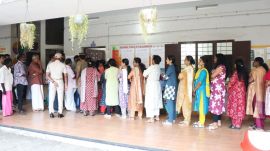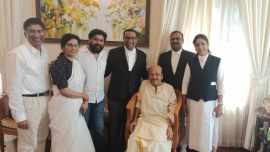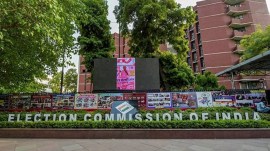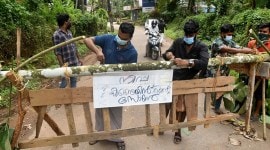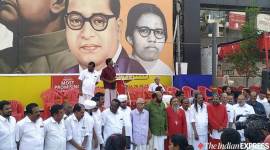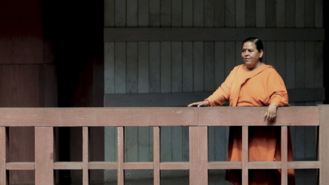Kerala
The political scene in Kerala is predominantly marked by the competition between two major coalitions: the Left Democratic Front (LDF) and the United Democratic Front (UDF). The LDF is led by the Communist Party of India (Marxist) or CPI(M), and includes other left-wing parties, while the UDF is primarily led by the Indian National Congress, along with other centrist and right-leaning parties. This bipolar political structure has led to a pattern where power alternates between these two coalitions in state elections, reflecting a politically engaged and ideologically motivated electorate.
Kerala's political distinctiveness is also underscored by its history of land reforms, educational policies, and healthcare initiatives, which have contributed to its high human development indices. The state's commitment to social welfare is evident in its achievements in public health, education, and social security, often setting benchmarks for the rest of the country.
Moreover, Kerala has a strong tradition of political activism and mass movements, dating back to the struggle for independence and reform movements that aimed at caste and gender equality. The state's political culture is characterized by high levels of political participation and awareness among its citizens, which is reflected in the significant voter turnout during elections.
In recent years, Kerala has also seen the rise of identity politics, with various caste and religious groups asserting their influence. However, the state's political discourse remains largely focused on development issues, social justice, and secularism. The environmental and developmental challenges, such as those posed by climate change and sustainable development, are increasingly becoming part of the political conversation in Kerala.
KERALA NEWS
Kerala High Court reduces externment of ‘known rowdy’ from a year to 6 months
December 10, 2025 4:28 pm
Kerala High Court externment, Kerala High Court judgment: Justices A K Jayasankaran Nambiar and Jobin Sebastian said that such an order of externment has a heavy bearing on the “personal as well as fundamental rights of an individual.”
Kerala case has a silver lining, breaks a silence
December 10, 2025 7:29 am
Since 2017, when the survivor went to the police, this solidarity, and the entrenched silence that it has helped break, has been the silver lining that glimmered through the cloud that hung over the case.
Kerala Local Body Election 2025 Voting Live Updates: Polls phase 1 crosses 50% voting; UDF, LDF claim confidence of major win
December 09, 2025 7:22 pm
Kerala Local Body Election 2025 Polling Live Updates: Polling for the first phase of the Kerala local body elections began at 7 am on Tuesday across seven districts -Thiruvananthapuram, Kollam, Pathanamthitta, Alappuzha, Kottayam, Idukki and Ernakulam.
Malayalam filmmaker P T Kunju Muhammad booked for ‘sexual harassment’
December 09, 2025 1:03 am
According to police, both Muhammed and the complainant were members of the selection committee for the upcoming International Film Festival of Kerala (IFFK). Muhammed is the chairperson of the committee.
‘It was after Manju’s statement…’: Why Dileep mentioned ex-wife Manju Warrier in his first comments after acquittal
December 08, 2025 2:33 pm
Warrier is one of Malayalam cinema’s most well-known actors. In 2017, two days after an actress was sexually assaulted in a moving car, Warrier had alleged that it was the result of a criminal conspiracy
Railway projects in Kerala: DPR work begins for over 750 km new rail lines - check routes
December 07, 2025 2:24 pm
Railway Projects in Kerala: The initiative aims to improve train operations and increase service frequency while strengthening the state’s rail infrastructure and supporting regional economic growth.
How 2017 actress assault case involving Dileep brought about churn in Malayalam film industry
December 08, 2025 11:11 am
Dileep assault case, 2017 Malayalam actress assault case: The assault was allegedly a part of a larger conspiracy orchestrated by actor Dileep
In Kerala, over 20 lakh SIR forms ‘uncollectible’
December 10, 2025 11:57 am
According to police, Noor Jahan signed the official documents on her sons’ behalf despite their absence from the country. Along with her, police have also booked her sons, Amir Khan and Danish Khan, for their alleged involvement in submitting misleading details.
Breather for rape-accused Kerala MLA Rahul Mamkootathil as HC prevents his arrest
December 07, 2025 3:25 am
The Congress on Thursday expelled Rahul Mamkootathil from the primary membership of the party minutes after the Thiruvananthapuram sessions court had rejected the Palakkad MLA's pre-arrest bail petition.
On state request, EC extends Kerala SIR by one week
December 06, 2025 1:26 am
According to the new schedule, electors in Kerala can now submit enumeration forms till Dec 18
KERALA PHOTOS
Wayanad Landslide: 93 dead, Coast Guard dispatches equipment and dog teams for rescue ops
July 30, 2024 10:05 pm
Kerala Chief Minister Pinarayi Vijayan said 93 people have died and around 128 were injured in the massive landslides in the northern Wayanad district, leaving behind a trail of destruction and despair.
Heavy rain, floods wreak havoc in part of India
June 08, 2024 1:43 pm
The southwest monsoon, which entered Maharashtra continued to pass over the state and has advanced into parts of central Arabian sea, parts of Karnataka, Maharashtra, Telangana, coastal Andhra Pradesh, central Bay of Bengal and northwest Bay of Bengal.
Kerala on high alert following Nipah outbreak
September 15, 2023 1:36 pm
Indian fans celebrate Argentina's long walk to World Cup victory
December 19, 2022 12:53 pm
Indian fans celebrate Argentina's win at the FIFA World Cup 2022, held in Qatar.
'Sea erosion, loss of traditional livelihood': Kerala fishermen up in arms against Adani Port project
August 22, 2022 10:32 pm
'Sea erosion, loss of traditional livelihood': Fishermen up in arms against Adani Port project
Orange alert issued in Kerala, heavy rainfall leads to waterlogging in the state
August 01, 2022 2:19 pm
An Orange alert has also been issued in eight districts for August 2, 12 for August 3 and 12 on August 4, according to an IMD district rainfall forecast.
Frost in Munnar as temperature dips below zero
February 02, 2022 9:11 pm
On February 2, Chundavurri estate, near Munnar recorded a temperature of minus 1-degree celsius.
In Pictures: Rahul Gandhi swimming with Kerala fishermen during his recent Kollam visit
February 26, 2021 10:36 am
During his recent visit to Kerala, Congress leader Rahul Gandhi interacted with the fishing community, ventured into the sea with the fishermen and took a stab at fishing.
Air India Express flight from Dubai crashlands in Kozhikode | See pictures
August 08, 2020 12:02 pm
An Air India Express flight with 190 passengers on board skidded off the runway and split into two while trying to land at Kerala’s Kozhikode airport in heavy rain on Friday evening.
On Republic Day, thousands form human chain against CAA-NRC in Kerala, Kolkata
January 27, 2020 8:57 am
After the rehearsal at 3:30 pm, the human chain took shape at 4 pm. It is to be followed by public meetings at over 250 places across the state.
KERALA VIDEOS
17 Year Old's Viral Video Throws Light On Beach Sand Mining in Southern Kerala
June 22, 2020 6:05 pm
An important anti-mining campaign by a bunch of villagers in Alappad, Kerala was brought to public spotlight through the video of a 17 year old class 12 student.
First woman climbs Kerala peak that women were banned from
June 22, 2020 6:05 pm
Dhanya Sanal became the first woman to climb the Agasthyakoodam peak in Kerala on Tuesday after the High Court recently lifted a restriction on women undertaking the annual trek.
Vanitha Mathil bring together Kerala women
June 22, 2020 6:06 pm
Vanitha Mathil bring together Kerala women
Elephant calf rescued from well
June 22, 2020 6:07 pm
An elephant calf which accidentally fell in a well was rescued by locals and forest officials in Kerala's Ernakulam district.
Kannur International Airport Set to Take Flight
June 22, 2020 6:08 pm
Kannur International Airport (KIAL), the fourth in Kerala, will be dedicated to the nation on December 9. The airport will offer better access to travellers from north Kerala and parts of Karnataka like Coorg.
Women know where to go and how to behave, Uma Bharti on Sabarimala
June 22, 2020 6:12 pm
On the Sabarimala verdict, union minister Uma Bharti said the court cannot be blamed for its intervention. This comes just days after BJP President Amit Shah said that meddling with the affairs of the temple was a conspiracy by Communists in Kerala.
Sabarimala gates opened for women but protesters deny them entry
June 22, 2020 6:13 pm
The gates of the Sabarimala temple were opened to women of all ages on Wednesday, but protesters blocked the devotees from entering the shrine and warned them of consequences.
What Indu Malhotra, the only judge who disagreed on the Sabarimala verdict, said
June 22, 2020 6:15 pm
Justice Indu Malhotra said that it is not for courts to determine which religious practices are to be struck down.
Kerala received a lot more rain than its dams could handle: News in Numbers
June 22, 2020 6:16 pm
Three days of intense rainfall, from August 15 to August 17 brought in more than what the dams could accommodate, making it necessary to release water. This is what the Central Water Commission (CWC) report on the Kerala floods observed.
How much damage Kerala suffered: News in Numbers
June 22, 2020 6:17 pm
With some time passing, an assessment of the loss in Kerala can be made. Take a look in today’s News in Numbers.
Best of Express








